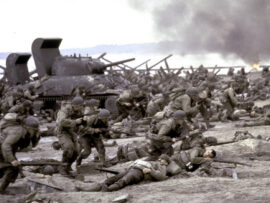“War is a necessary evil,” the saying goes. Rational people don’t seek to engage in war and go to battle only as a last resort. The Torah, in laying the foundation of Jewish jurisprudence, details the rules of war in this week’s portion. Among them are that the Jews must attempt a peaceful resolution first, and the Jewish army must be careful not to harm the environment by uprooting fruit-bearing trees.
Most interesting, however, is the prelude to going out to battle. A kohen, (priest), appointed specifically for this task, addresses the crowd. He tells them, “Shema Yisroel, Hear O Israel, you are about to wage war against your enemies! Don’t be afraid of the enemy’s tactics and devious plans. G-d is on your side to protect you.”
Rashi takes note of the kohen’s opening line, Shema Yisroel, and makes the correlation to the Shema prayer Jews declare twice a day: “Shema Yisroel Hashem Elokeinu Hashem Echad -- Hear O Israel, Hashem is our G-d, Hashem is One.” He comments homiletically that the kohen is saying that the Jews will merit victory even if their single merit is that they utter the Shema!
What is the significance of the Shema prayer that it serves as such a powerful merit for victory on the battlefield?
The Shema is more than just the declaration that Hashem is our G-d, but also that He controls the entire world. Everything that occurs in the world is because He decreed it to happen in the manner in which He so desires. Nothing is left to chance.
When a country wages war, it is very easy for generals and military experts to rely on their own skill and bravado. The Shema underscores, though, that the Torah views things differently. Of course, Jewish military experts must devise a strategy for victory, but they must bear in mind that they’re in G-d’s hands. They need His assistance at all times. Reciting the Shema is an affirmation of that belief. Thus, it is a worthy merit for success on the battlefield.
I recently read a book that highlighted four World War II battles that military experts and historians agree changed the tide in the Allies’ favor: Midway, Barbarrossa/Stalingrad, El Alamein and D-Day. The author proved through painstaking research how so many events just “happened to work out” that it’s almost impossible for anyone to believe that a higher element wasn’t involved in the war.
D-Day, for example, is considered one of the greatest military achievements. Yet, just about the entire operation on June 6, 1944 didn’t go as planned. The paratroopers who dropped in Europe the night leading up to the Allied invasion didn’t land where they were supposed to. The landings themselves were off course, sometimes to Allied advantage, such as Utah Beach. Unbeknownst to the Allies, the German general in charge of fortifying the French coastline, Erwin Rommel, was home for the day to celebrate his wife’s birthday, which happened to be June 6. He couldn’t be reached in time. The day may have gone differently had the Desert Fox been on the scene.
In addition, Hitler was asleep the morning of the invasion; his generals didn’t wish to awaken him lest they incur his wrath. This insured that the Panzer tanks under his personal orders would not be used until later in the day. General Dwight Eisenhower, the Allied Supreme Commander, understood the thin margin for error. He prepared a statement which he kept in his pocket to announce that the operation was a failure, he was taking full responsibility, and that he had ordered the troops to retreat. Thankfully, he never needed to pull out that one.
In our own lives, many of us can relate incidents where too many things “just happened” to fall into place, all at the right time, to help us determine our course of action.
If we would reflect a bit, perhaps we’d detect a subtle message reminding us that there’s Someone on High who is guiding us through life’s twists and turns. Reciting the Shema affirms our belief in this ideal. In this merit, may we and the entire Jewish Nation always merit His guidance and protection.

